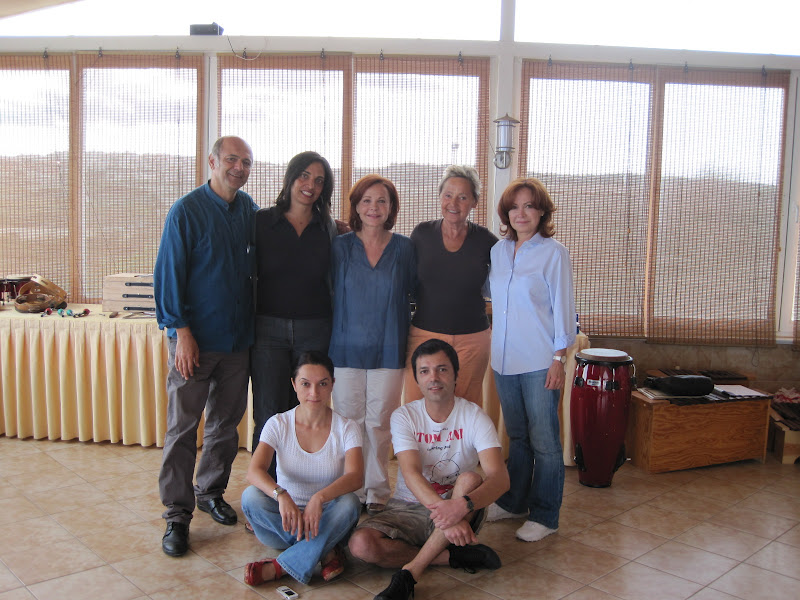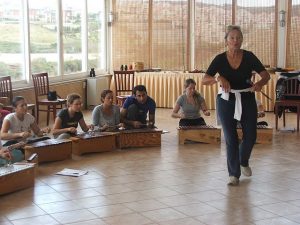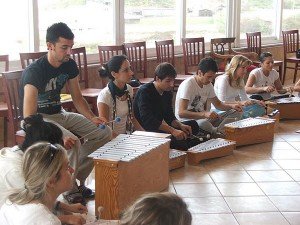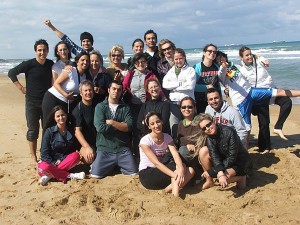Andante
Güher & Süher Pekinel about the Project to improve the Musical Education in Anatolia
by Sanat Deliorman, published in Andante Magazine, June 2015
“Türkiye’deki Müzik Eğitimi ve Orff Yaklaşımı” (Music Education in Turkey and Orff Approach)
Can you tell us how the “Project to Improve Musical Education in Anatolia” began?
We decided to start an initiative towards updating the system after establishing a music department in TEVİTÖL in 2006 and experiencing the difficulties in music education in Turkey firsthand.Having lived overseas in different countries for long periods of time and being familiar with the Orff system, which has been integrated into music lessons in various ways, we examined the Carl-Orff Schulwek Education and Consultancy courses in order to research the state of music education in Turkey.
As is known, the Orff education system is a method that has been recognized and implemented worldwide. Its purpose is to utilize all branches of art in order to uncover the creative power and different important social and psychological skills within us all by utilizing rhythm, motion and speech. The Orff system approaches human values as a whole.
Best known in our country for his work entitled “Carmina Burana,” Carl Orff not only gave lessons to important Turkish composer Ferit Tüzün at the Munich Academy, but also supported the Munich Philharmonic performing the debut of three of Tüzün’s pieces. The many instruments that Carl Orff developed himself and donated to Turkey were first brought to the country between the years 1951-56 by musician Muzaffer Arkas in collaboration with the head of the Ankara Maarif College (now TED), Mümtaz Tarhan. However, their implementation eventually proved ineffective due to insufficient infrastructure. Carl Orff system needs to be integrated into the existing system in order to become permanent.
Music occupies a very important place within arts education, which occupies an intrinsic dimension of pre-school education. The goals of pre-school music education is to aid children’s cognitive, emotional, physical, and social development, to enable them to express their feelings, thoughts, and impressions through the aesthetic language of music, and prepare them for elementary education by revealing their creativity and ensuring the development of their mother tongue, under the vision of raising multi-faceted individuals.
Therefore, in line with our opinions and the data we summarized, we developed the “Project to Improve Musical Education in Anatolia” in 2010, in order to ensure Orff Education system could be implemented as part of music courses in all of the schools in Turkey. We applied to the Ministry of National Education (MEB) with this project and signed a protocol with the MEB on 10.09.2010 in order to realize the Anatolia Improvement Project. The education in question was implemented in pre-school and elementary school classes in 9 pilot cities (Istanbul, Ankara, Antalya, Izmir, Mersin, Bursa, Trabzon, Gaziantep, Mardin). We assumed the project’s fundamental configuration, implementation, and sponsorship ourselves. A great program was established and executed in collaboration with Prof. Jungmair of the Turkish Center of Orff Schulwerk. The MEB undertook the accommodation services so that participants could return for the 2nd and 3rd stages of the project. This was a serious help for the continuation of the Project.

What sort of progress has been made during the first and subsequent stages of this project?
In the preparatory stages of the Project the music lessons in schools were increased by two hours a week, parents were informed, their participation was encouraged, and teachers began to receive additional training. 30 of the 60 teachers recommended by the ministries of the 9 pilot cities were selected and provided with training at Bosphorus University’s facilities for 10 full days and then, subsequently, at the private ALEV elementary school’s Orff Center in two separate sessions. 10,000 children had been reached by the end of the first year. Prof. Jungmair, the former vice president of the Salzburg Mozarteum Orff Institute, personally directed this education.
The principles of the schools of the 30 teachers, who received training as part of the pilot project, were also tasked with opening music classrooms, and music education, which had been halted for 18 years, found its place in classrooms once again due to the enthusiastic response from students. Arising problems were solved in collaboration with teachers and by personally contacting principles. The MEB inspected the courses and announced that they would appoint more music teachers as part of the project.
What stage is the Project in as of today?
Educators that received training as part of the project are still teaching at the schools they were selected from and, even if less often, they continue to intermittently attend improvement seminars at the Orff Center. Unfortunately, since 2012, the project had come to a standstill due to the continuous changes of ministers and principles within the MEB staff. However, it came to acquire continuity and opened new doors by finding a sponsor, thanks to the Dr. Nejat F. Eczacıbaşı Foundation’s interest in the Carl Orff education. It is incredibly gratifying for the foundation to support a project like this. On the other hand, even though the teachers that were trained within the scope of our program continue to carry out their duties, as we have stated before, it is of utmost importance for the future of this education that the Orff system be integrated into the music departments of universities for the systematic training of high quality, dedicated educators, in order for this program to continue and spread to schools across Anatolia.



How would you evaluate “Pre-School Music Education” in Turkey?
In Turkey under the title “Pre-School Education” children are generally provided with chorus, individual instrument, and rhythmic dance training only in private schools and daycares. While this is encouraging, by being solely open to private education this development is not enough to meet current needs. Realizing the implementation of the Orff method, especially in state pre-schools and elementary schools, will open new doors in music, as well as in overall education, by supporting the development of future generations’ aesthetic and artistic foundations. As it is in Europe, the most important topic in music education is that music lessons are taught by pre-school teachers with knowledge and experience, who have been specifically trained for this.
What are your thoughts on the future of this project?
Firstly, it is vital that the project expand to universities in order to spread all across Turkey. The continuation of the 10 state school pilot project, eventually sponsored by the Eczacıbaşı Foundation and executed in collaboration with MEB, is also important for us all. This event demonstrates the importance of surpassing the project phase and becoming a permanent part of the curriculum.
When observing this case worldwide, it is accepted by international educators that Finnish students, which score the highest on all international exams and assessments, claim this success as a result of their training with the Orff system. One of the main reasons for the success of the country’s music education system is that teachers who are working in pre-school facilities are graduates of a special pre-school education program offered at universities. It is important to note that this program not only contains courses in basic music education and pre-school education, but also those in child development and psychology, aesthetics education for children, children’s literature, drama, children’s choir conducting, music-play-movement, and music and dance. In Turkey, however, such highly equipped institutions, departments, or even programs that train “Pre-school Music Educators” are only newly forming. Furthermore, in departments, conservatories, or other music schools training music teachers, the major area course offerings in music education and courses covering cognitive development psychology education are insufficient.
For the intensive implementation of the system, it is inevitable that 3 distinguished educators from Salzburg, who would be appointed through the MEB and our sponsor’s initiatives, step in in order to control the quality of education at selected prominent universities, settle the system’s foundation, and hold seminars, just as they do in Europe. As is mentioned in the preface, Prof. Jungmair and Prof. Haselbach have held productive seminars for many years at select universities as educators with the highest profile in this field.
The continued support of the Carl Orff Center in Turkey and the fact that they can become part of the University, if they so choose, will accelerate the required integration of the Orff Education. In today’s conditions it would take a very long time for the Orff Center, which provides dedicated and quality education, to train a teaching staff that could encompass all of Turkey with their internal capacity. As such, a method like this would enable many more teachers, who are needed in Anatolia, to deliver this education starting with pre-schools and including all children.
Accordingly, it is extremely important that YÖK steps in in the next phase, in order to ensure that the Orff Education continues to be a part of the Music Education departments of Istanbul Marmara, Izmir Dokuz Eylül, Gazi, and Bolu İzzet Baysal universities, as this will enable this education to be provided at other universities that are deemed appropriate in the future.
Keeping the standards and required “education improvement programs” of Turkey’s Orff Center in mind, only the most distinguished teaching candidates that graduate from universities will enable the training of new teachers. We are also of the mind that it would be beneficial for these teachers to attend the Salzburg Orff Institute, as well as various seminars at “International Summer Courses.”
Within this discussion, we would once again like to highlight how important it is that the music education that should be offered at state schools returns as part of the curriculum.
